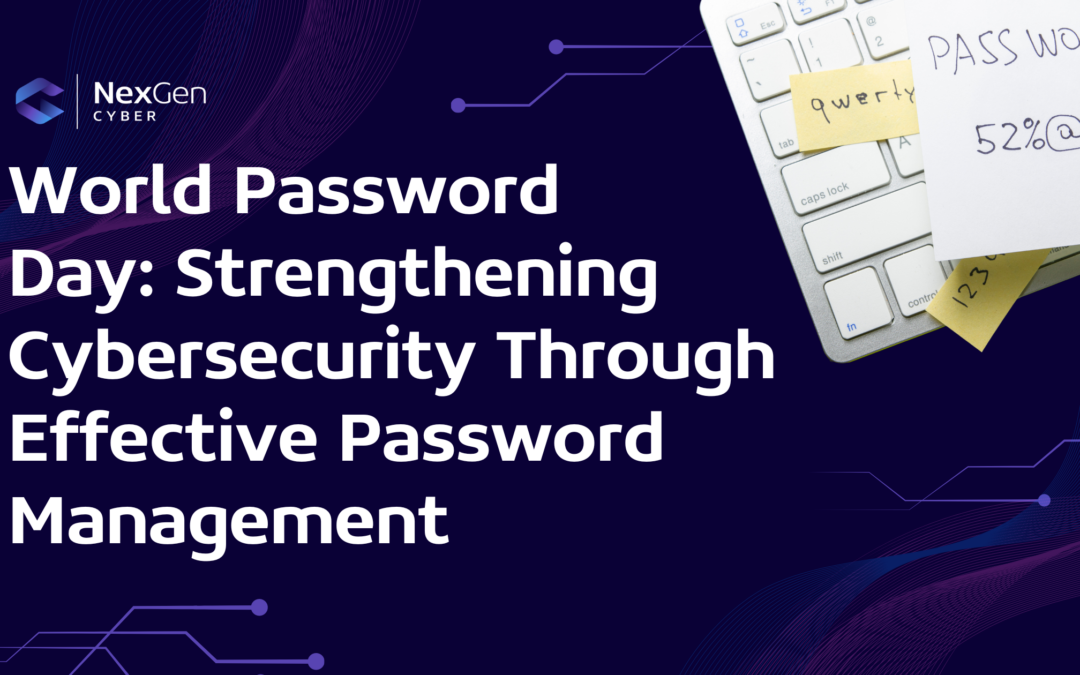It’s a known fact that Cyber threats are part of the digital world we live in and can cause detrimental issues such as data breaches, decreasing workflow, reputational damage and even bankruptcy.
As cyberattacks become more sophisticated and rise in frequency we know how important it is to use plenty of cybersecurity practices. With World Password Day on 2nd May it reminds us of how important it is to implement robust password management strategies, as passwords are the gatekeeper to your data. From educating employees on best practices, to using password management tools, there are many ways businesses can keep themselves and their data safe.
1. Never Share Passwords
One of the most important principles of password management is to never share your passwords with others. It may seem convenient to share passwords with colleagues however this can increase your potential security risks. Your passwords could inadvertently or purposefully end up in the wrong hands which could then compromise your digital security and online data. Colleagues could also use your passwords for their own accounts, trying to make life ‘easier’ by remembering less passwords but this again can compromise security as cyber criminals could then gain access to multiple accounts. Businesses should emphasise the importance of keeping passwords confidential and discourage employees from sharing them under any circumstances.
2. Train Employees
A great way to combat sharing passwords and raising awareness of the risks if through training employees on password best practices. 90% of cyber incidents (according to TechRadar) are the results of human error. By providing your employees with comprehensive training, you can empower them to recognise common threats, practice using strong passwords, enable Multi-factor authentication and inform them of how to take preventative action to secure sensitive information.
3. Implement Password Policies
As well as educating employees, businesses should implement password policies across their company. These should outline requirements for password complexity, when they should change their password as well as guidelines on storing passwords securely. By establishing clear expectations, businesses can ensure consistent password best practices and reduce the likelihood of security issues.
4. Regularly Update Passwords
Regularly updating your passwords is an essential aspect to password management. Passwords should ideally be changed every 60 to 90 days, this helps to decrease the chances of password guessing attempts and attacks. Get your IT provider to implement password management that reminds and forces employees to change their password on a regular basis. Don’t forget to use complex and unique passwords that contain a combination of uppercase and lowercase letters, numbers, and special characters. This will also help to decrease the risk of unauthorised access.
5. Use Password Management Tools
You can also leverage password management tools to help streamline your password management processes and to enhance your security. Password management tools offer features such as password generation, storage and auto-fill which will help to make it easier for your employees to create and manage multiple passwords. You can also use these tools to manage areas such as audit logs, accessing centralised control and more admin duties. This allows your business to enforce password policies and monitor compliance effectively.
World Password Day reminds us to reflect on password management practices and to take proactive steps to make sure our data is safe. Educating employees on password best practices enables them to take control of their security as well as keep your business safe. Don’t forget to also leverage password management tools as this will allow your business to enhance security, reduce risks and protect sensitive information. Ultimately, effective password management is essential for safeguarding and protecting your data in todays ever evolving digital world.
If you’d like to discuss more about cybersecurity when it comes to your business, then please reach out!
Want to speak to one of the team?
Speak to one of our technical product specialists or maybe one of our expert solution architects to find out how we can help you with your requirement.

